Debra L. Martin's Blog, page 322
October 31, 2011
Horror Writers Confess!
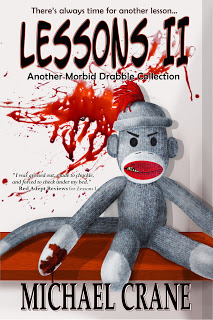 Confession time: Zombies scare the crap out of me
Confession time: Zombies scare the crap out of me by Michael Crane
Okay, so maybe it's not a realistic fear. I mean, it's not like there are zombies knocking on my door trying to get in (at least… I hope not!). Still, I can't bring myself to watch zombie movies late at night because I know I'll get nightmares—and this is coming from somebody who can't remember his dreams! I don't care what Roger Ebert says, even when they're at their slowest they still manage to be menacing!
Maybe the thing that scares me the most about them is you can't reason with them. There's no begging for your life when it comes to zombies. Well, you could—but it'd be kinda pointless. A zombie has only goal, and that is to feast upon the living. That's it. End of story.
And let's be honest here. You can make fun of how slow and sluggish they appear to be (at least in the older movies they were), but imagining that your loved ones have turned into walking corpses is one hell of a scary picture.LESSONS II: Another Morbid Drabble Collection
Amazon: http://amzn.com/B004IE9VMW
B&N: http://www.barnesandnoble.com/w/lessons-ii-michael-crane/1029735950Michael Crane author page: http://www.amazon.com/Michael-Crane/e/B003Z9YW5W
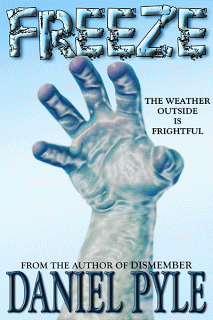 Why do I write Horror?by Daniel Pyle
Why do I write Horror?by Daniel PyleWhy do I write horror? That's the question people ask me most often. (Especially my mother-in-law and my children's pediatrician.) When they find out what kinds of stories I spend my free time creating, folks assume something terrible must have happened to me as a kid, that my parents kept me locked in a cage in the basement and put their cigarettes out on my fleshy bits, or bought me a kitten just to skin it in front of me and watch me cry, or put gravy in my hair and threw me in a pit with starving dogs, or…well, you get the idea. But the truth is, none of those things happened. My life has been full of love, support, encouragement, and un-skinned kitties. I don't write horror out of some perverse desire to get back at the universe. I write it—and read it—because it's emotionally charged and exciting. Horror opens a door to a world where your boring next door neighbor can grab a stake, slay a vampire, and become a hero, where the creaking in the attic might be mutated freaks watching you through holes in the ceiling, where every shifting shadow is a potential threat, where you could die a horrible, agonizing death, but where you're sure as hell alive before you do.I'm a lucky guy. I get more than my fair share of comfort in real life. When I open up a book, whether it's one I'm reading or one I'm writing, I want to experience the other end of the emotional spectrum. I want to be scared. And I want you right there with me. Why is that? I hear you asking. Well, that's easy: I want you there so that when the maniac shows up with his rumbling chainsaw, I don't have to run faster than him, I only have to run faster than you.
http://www.amazon.com/dp/B004YX8RBShttp://search.barnesandnoble.com/Freeze/Daniel-Pyle/e/2940012459985#TABShttp://itunes.apple.com/us/book/freeze/id435858835?mt=11&ls=1https://www.smashwords.com/books/view/59170
Daniel Pyle author page: http://www.amazon.com/Daniel-Pyle/e/B002ZE9JOC
Daniel Pyleauthor of dark and suspenseful fictionwww.danielpyle.com
Published on October 31, 2011 05:00
October 30, 2011
Halloween Traditions for horror writer Joel Arnold
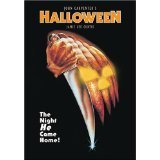 Halloween, 1978 – I was ten years old, living in Rochester, Minnesota. I was too young to see John Carpenter's Halloween, which had been released only a week earlier – even if I'd had the chance, I doubt I would've gone at that age. Sounded too damn scary. But for the actual celebration of Halloween, ten was a great age. Back then we were let out on our own with a group of friends, and by that time I realized that those plastic jack-o-lanterns used for collecting candy were for amateurs. It was balls-out with the pillowcase if you were taking your candy collecting duties seriously.
Halloween, 1978 – I was ten years old, living in Rochester, Minnesota. I was too young to see John Carpenter's Halloween, which had been released only a week earlier – even if I'd had the chance, I doubt I would've gone at that age. Sounded too damn scary. But for the actual celebration of Halloween, ten was a great age. Back then we were let out on our own with a group of friends, and by that time I realized that those plastic jack-o-lanterns used for collecting candy were for amateurs. It was balls-out with the pillowcase if you were taking your candy collecting duties seriously. The week leading up to the event was one filled with anticipation. In school, we made Halloween decorations, cutting pumpkins and bats and witch's hats out of colored construction paper. They'd serve us milk infused with green food coloring, calling it Witch's Brew or Ghoul's Delight, and pass out sticky popcorn balls. The local police would stop by and serve their safety warnings with a bag of caramels and Smarties.
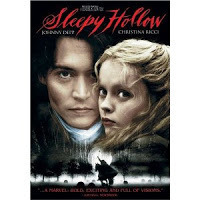 We'd gather in the lunchroom/gymnasium and watch the Disney version of The Legend of Sleepy Hollow or Them or Abbott & Costello Meet Frankenstein shot from a 16mm projector up onto a pull-down screen (and there was always some smartass who'd stick a finger in front of the projector's light to make it look like a huge silhouetted appendage was poking one of the actors in the ass). We'd also have the Halloween parade, where we'd all march in single file around the school grounds while parents took pictures of us.
We'd gather in the lunchroom/gymnasium and watch the Disney version of The Legend of Sleepy Hollow or Them or Abbott & Costello Meet Frankenstein shot from a 16mm projector up onto a pull-down screen (and there was always some smartass who'd stick a finger in front of the projector's light to make it look like a huge silhouetted appendage was poking one of the actors in the ass). We'd also have the Halloween parade, where we'd all march in single file around the school grounds while parents took pictures of us.Halloween, 2011 – So now I'm a bit older...okay, a lot older, and I try to watch John Carpenter's Halloween annually, although now I have to watch it after the kids are in bed, because they're nine and ten years old. Last year, their plastic jack-o-lanterns filled up so fast – it's time to turn them on to the pillowcase method if we're going to get balls-out serious.
I no longer live in Rochester, and the schools up here don't celebrate Halloween. Instead they have a Fall Harvest Festival, or something like that, but that's okay. We still spend great care picking out just the right pumpkins, and the kids help design the faces that I'll carve like a drunken plastic surgeon into the orange flesh. They don't care for the pumpkin seeds I roast, but I still do it.
My wife or I alternate each year in taking the kids out trick-or-treating. Our son has autism, and so we need to stick to his side when we go up to ring the doorbell, partly to coach him on what to say (he usually has the patter down by the end of the night) and partly to keep him from running into the houses and grabbing handfuls of candy. He loves candy. He also gets excited about dressing up in his costume and will sometimes put it on for days afterward when he gets home from school. His older sister loves candy, too, and her best friend is coming along with us this year.
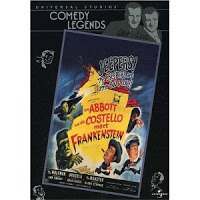 I think after they get home on this upcoming Halloween night, as they sort out their candy on the living room carpet, I will turn on Abbott & Costello Meet Frankenstein. And after they go to bed, I'll sit a spell in the silence of the night watching the candles sputter and flicker inside their hollowed out encasements before finally blowing them out.
I think after they get home on this upcoming Halloween night, as they sort out their candy on the living room carpet, I will turn on Abbott & Costello Meet Frankenstein. And after they go to bed, I'll sit a spell in the silence of the night watching the candles sputter and flicker inside their hollowed out encasements before finally blowing them out.Click here for a free story I wrote that takes place on a Halloween night.
Joel Arnold's author page: http://www.amazon.com/Joel-Arnold/e/B003SECIGY
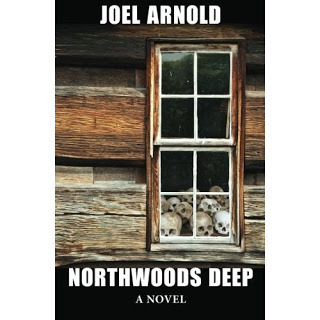 http://www.amazon.com/Northwoods-Deep-ebook/dp/B003UHVXCE
http://www.amazon.com/Northwoods-Deep-ebook/dp/B003UHVXCEwww.smashwords.com/books/view/18433
http://www.barnesandnoble.com/w/northwoods-deep-joel-arnold/1102494944?ean=2940011069949&itm=2&usri=joel%2barnold
Published on October 30, 2011 05:00
October 29, 2011
ZOMBIES ON MY MIND by Derek Prior
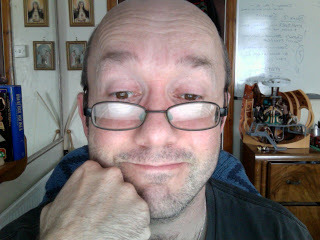 Zombies have been on my mind a lot lately. Their resurgence started when I was reading Robert J. Duperre's The Fall for review. I read a few chapters to my son and he did that thing children do so well: got fascinated by fear and and turned it into an obsession. It wasn't his first encounter with the genre—he already loved the grotesquery of Marvel Zombies, and had come across zombie-like monsters in Doctor Who (The Curse of Fenric, Waters of Mars). We'd even watched the hilarious Zombieland the year before.
Zombies have been on my mind a lot lately. Their resurgence started when I was reading Robert J. Duperre's The Fall for review. I read a few chapters to my son and he did that thing children do so well: got fascinated by fear and and turned it into an obsession. It wasn't his first encounter with the genre—he already loved the grotesquery of Marvel Zombies, and had come across zombie-like monsters in Doctor Who (The Curse of Fenric, Waters of Mars). We'd even watched the hilarious Zombieland the year before.He started drawing zombies, producing zombie comics, inventing zombie stories, and even making zombie films on a camcorder. We discovered iMovie and even edited a short film, added a cool soundtrack, and he got to play his own character, zombie-killing cowboy, Elias Trent. My acting training came in handy teaching him to speak like Clint Eastwood crossed with Jesse Ventura's character from Predator ("Ain't got time to bleed"). He even got to shoot me a few times. It wasn't long before he worked out that you needed a head shot to make it permanent.
As zombiemania ran its course, I started to see them around every corner. I'd never watched zombie movies in the past (with the notable exception of Quarantine), never read the genre, but the walking dead had nevertheless snuck into my own work. There were zombies beneath the dirty old cafe in Thanatos Rising (probably still are as far as I'm aware. Harry Chesterton didn't know about the head-shot); the dead are raised in book one of my Shader series, Cadman's Gambit, and a whole bunch of characters get zombiefied in book two, Best Laid Plans. I'd even started writing a fantasy novel years ago in which a Templar knight faces off against a village of the dead. It only took the catalyst of The Fall to send all these skeletons clattering out of the cupboard. The contagion had been there all along. Zombies weren't so much on my mind as eating up my brain.
The first thing I do when I get interested in something is hunt out and soak up every bit of information I can on the subject. My son's the same. He's already chewed up and spat out Battlestar Galactica, Star Wars, Doctor Who, James Bond (regrettably), and it was inevitable we'd do the same with zombies.
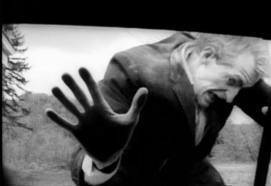 We started with a Google search: "Romero", and within minutes were watching Night of the Living Dead on Youtube, swiftly followed by Day of the Dead. A Resident Evil game was picked up from Ebay, and we watched one of the related films. A hunt through the local used DVD store turned up Dawn of the Dead (2005 remake) and Land of the Dead. We trawled through the clips on Youtube (Evil Dead, Army of Darkness, and a host of "How to Survive a Zombie Attack" shorts). Then I remembered Shaun of the Dead, which we watched a couple of times. It was even funnier now I could see all the references.
We started with a Google search: "Romero", and within minutes were watching Night of the Living Dead on Youtube, swiftly followed by Day of the Dead. A Resident Evil game was picked up from Ebay, and we watched one of the related films. A hunt through the local used DVD store turned up Dawn of the Dead (2005 remake) and Land of the Dead. We trawled through the clips on Youtube (Evil Dead, Army of Darkness, and a host of "How to Survive a Zombie Attack" shorts). Then I remembered Shaun of the Dead, which we watched a couple of times. It was even funnier now I could see all the references.I started to wonder what it was about zombies that had got us hooked. The more I looked into the genre, the more crazily popular it seemed. Part of it stems from the human fascination with fear, but it's not a simple matter of being horrified at the dead coming back to life. I'm not denying that's a huge part of it (I remember being just a little traumatized by the corpses clawing their way out of their graves in Thriller), but I would suggest that it's more to do with fear of contagion, coupled with the loss of personal identity.
The contagion thing is easy to understand: it's not enough that the zombies keep coming at you inexorably (I always think of that epic Magog attack in Andromeda where the hairy nasties just keep piling on until the crew are overwhelmed). Zombies have been doing that for years. With the older (slow, lurching) kind, they need weight of numbers to have any chance of cornering and overwhelming you. They speed up appreciably in the most recent Dawn of the Dead, which made them a damned sight scarier.
The problem with contagion is that you can be putting up a good fight, pulverizing your way through a phalanx of flesh-eating zombies, and then you take a single bite, nothing more than a flesh wound, and it's all over. How many characters in this situation either turn their own guns on themselves, or get someone else to do it for them? Once you're bitten, there's no hope, and virtually everyone gets bitten sooner or later. Not only that, but the bitten then die, rise up, and add to the aforementioned weight of numbers. Heck, it even happened in Marvel Zombies. The Silver Surfer arrives to herald the coming of Galactus, Eater of Worlds. The undead superheroes pull him off his board and chomp into him. Galactus duly turns up to eat the Earth and finds scores of super-powered zombies ready to take him on. It's a big meal, for sure, but they make short work of him.
But what's so terrible about the contagion is what it does to you. Ultimately, it's about losing one's identity, losing awareness, cognition; humanity. The victim of a zombie attack is as much a victim of an attack on the concept of human personhood.
And yet we live in an age of the diminishing value placed upon the human person. In spite of the hyperbole of Western societies, people are reduced to commodities, consumers, units of production. They are manipulated to desire rubbish they don't need, follow trends, parties, customs that produce safe, servile, and utterly predictable social groupings. Occasionally a "mad" person sticks out from the crowd (think of Michael Douglass in Falling Down) but usually this is a flash in the pan and zombie life is resumed without too much unrest.
It's seen on a larger scale in revolution: the hordes of undeath are temporarily defeated as new ways are violently imposed, but gradually (that word "inexorably" again—it's the zombie writer's best friend!) the zombiefication process starts over. It's no accident the French Revolution was followed by the Reign of Terror.
[image error] But what is this personhood that's so terrifying to lose? If R.D. Laing is to be believed, it's a very common fear. In his phenomenological and existential analysis of the schizoid personality (The Divided Self), he explains how depersonalizing the other (Laing says petrifying, by which he means objectifying, or turning the other into an object) is the default defense mechanism of those seeking to avoid being objectified. In short, we turn others into zombies so that we can maintain our sense of being a real person. Whilst the example is intended for a specific personality disorder, the essence of this skewed way of relating to others is a danger for all of us. It's symptomatic of Nietzsche's dog-eat-dog world: the will to power.
Martin Buber addresses a similar issue in I and Thou where he describes the typical human relationship as a subject viewing an object. The ideal, for Buber, is inter-subjective communication: person to person. Naturally this involves a degree of risk. The zombie-making defense has to be dropped, but there's no guarantee we won't be zombified ourselves.
Zombies have even insinuated their way into philosophical discourse, where they are used as a challenge to purely functionalist views of consciousness, such as Dennett's computational model. The contentious issue, though, is whether zombies can conceivably exist, with the physicalists saying a resounding "no" and zombiphiles appealing to the conceivability argument:
1. Zombies are conceivable.2. Whatever is conceivable is possible.3. Therefore zombies are possible.
Sounds a whole lot like Anselm's ontological argument to me. Whatever the case, the acceptance of the possibility of zombies (like humans in all respects, except consciousness) implies a Cartesian dualism.
George A. Romero examines these ideas in Day of the Dead, where the zombie "Bub" seems to retain some residual memories and is capable of re-learning. He takes the idea further in Land of the Dead when the zombies not only have an enraged leader with a sense of the injustices perpetrated against zombie-kind, but they also have the ability to communicate, learn, and seek revenge.
Anäis Nin had a wonderful description of Antonin Artaud running around Paris waving a walking stick and shouting at people to wake up. Artaud perceived the masses as walking dead, and his Theatre of Cruelty was one way of bringing them back to life. He wanted to use the theatre in order to ignite a spark of religious ecstasy in his audience and bring them back to life. Artaud's ideas of cosmic cruelty are exemplified in the Romero canon of zombie movies: gratuitous flesh-eating, exaggerated violence, and the evocation of our primal fears. In the zombie genre, though, it is not religion, mystical experience, or peak experience mediated through the performing arts that resurrects us; it is the zombies waking us from our own zombiefied state. There's nothing like an apocalypse to shake us out of our lethargy. The characters in these movies are never more alive than when they are being overrun by the undead.
Romero takes the process a step further in his later films when the zombies appear to have pretty much won the day (Land of the Dead) and seem to go about setting up their own society. The zombies have reclaimed a degree of their humanity. How long will it be before they succumb to the same lethargy and need a new bunch of zombies to wake them up?
Social commentary is rife in the genre, not so much as a criticism of the kind of uniformity fifties SF saw in Communism (later epitomized by the Borg in Star Trek TNG), but more as a critique of the semi-conscious existence many seem to live as consumers within the servile state (see Hiliare Belloc on the subject). There are frantic attempts to fill that "god-shaped" hole at the centre of our being described by Augustine (Artaud calls it a void) with experiences, thrills, gadgets, the acquisition of things. Like David Gemmell's Bloodstone character, this only fuels more hunger. We are insatiable, but not necessarily fully human.
Russell T. Davies comments on this in his cyberman stories during David Tennant's tenure as the Doctor. The masses are shown as utterly dependent on new technology, whole crowds stopping dead in the middle of the street to receive new downloads on their ear-pieces. Technology is constantly upgraded, but the zombie parallel is at its strongest when humans are fully upgraded to cybermen. It is at this point they lose their personhood. They retain many of the physical actions (and all the language) of humans, but no emotions, no self-will, no freedom. They become automata. They become zombies.
But to return to the idea of zombies as the living dead, we are still faced with the absence of person. Zombies are not at all like the resurrection described by St Paul, St Gregory of Nyssa, or St Augustine. Yes, it is the same body risen, but it is a body presumably without a soul. Zombies are more often than not reanimated corpses driven by an insatiable hunger. They have no freedom from this basic drive. They don't quite qualify as human.
Even where there is no coming back to life, when zombies are created through Voodoo or mutation, the same holds true. Without consciousness, without the ability to imagine, override concupiscence, when there is an absence of the human quality of freedom, they are essentially no different to the walking dead.
Fantasy author David Dalglish has a thing about zombies. It's as close to necrophilia as you can get without some sort of major desecration. If Robert Duperre is the arch-connoisseur of all things zombie in his The Rift series, Dalglish is probably better thought of as Dr Zombie. They're everywhere in his Half-Orcs books, so much so that he should consider renaming the series Year of the Zombie Hordes (and a couple of half-orc geezers). His zombies are most definitely of the living dead variety, but with one interesting difference: some of them retain their consciousness, but are deprived of the active use of their wills (by either Velixar or Qurrah, both of whom are necromancers). It creates a terrific dynamic of the enslaved undead desperately wanting to break free, but utterly powerless to do so.
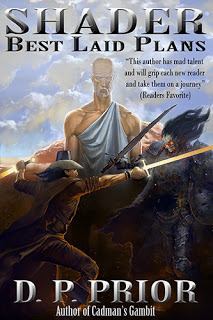 Something similar happens to one of the priest characters in my own Best Laid Plans. In that case, the necromancer, Dr Cadman, simply can't tolerate such dissent. A conscious zombie? No thank you, sir! Zap!
Something similar happens to one of the priest characters in my own Best Laid Plans. In that case, the necromancer, Dr Cadman, simply can't tolerate such dissent. A conscious zombie? No thank you, sir! Zap!In The Fall, Robert J. Duperre explores a bit of zombie/wraith point of view, where the supposed automaton retains some residual memories in the manner of Romero's Bub.
Generally, though, the norm is for mindless flesh-eaters who just keep coming at you, no matter how many you shoot in the head. They are as inexorable (!!!) as time, and just as hard to stave off. And the worst thing is, due to the high risk of characters being infected, the zombies come to foreshadow what most of them will ultimately become. In Zombie Land, there is no exit (to throw a nod to Sartre). As Roy Harper would no doubt say, "No one ever gets out alive".
In closing, I should apologize if my ramblings don't do justice to this vast subject. I'm relatively new to the subject and have no doubt failed to mention key texts, films, and novels. From my limited exposure to indie books that feature zombies, I'd like to point you in the direction of the following. I know there are bound to be countless others, but I seldom cast my net beyond the realm of fantasy.
My Thanatos Rising features zombies beneath Aberystwyth:http://www.amazon.com/Thanatos-Rising-Memoirs-Chesterton-ebook/dp/B003ZDP2E8/ref=sr_1_1?s=digital-text&ie=UTF8&qid=1316530796&sr=1-1
And finally, my Shader series has hordes of zombies in book 1, Cadman's Gambit, and book 2 (to be released in October), Best Laid Plans:http://www.amazon.com/Cadmans-Gambit-SHADER-ebook/dp/B005FHY1BW/ref=sr_1_1?s=digital-text&ie=UTF8&qid=1316530884&sr=1-1
Derek Prior (D.P. Prior) is a freelance editor (Homunculus Editing Services), reviewer (Indie Fantasy Review), and author.
Homunculus Editing Services: http://homunculuseditingservices.blogspot.com/
Indie Fantasy Review: http://indiefantasyreview.blogspot.com/
For all news on the Shader series of fantasy books by D.P. Prior, please visit:http://godsinthedreaming.blogspot.com/
Published on October 29, 2011 06:00
October 28, 2011
Sponsorship: STAKED by Sandra Edwards

Book Blurb:Ava Valentine is a time-traveling bounty hunter from the distant future. She's chased her fugitive back to present-day New York City, where she anticipates an uneventful capture even though she's a little on edge because she's meeting a new contact.
Dexter Stone is a mysterious soldier of fortune who's agreed to take Ava to her bounty--for a fee. What Ava's not expecting is to get mixed up with a man she suspects is a vampire!
After a run-in with an unsavory character from Ava's past, she and Stone are forced into an uneasy alliance. But very soon she'll discover she could be Stone's saving grace--or his downfall.
Buy Links:US Kindle: http://www.amazon.com/dp/B0052MSYRWUK Kindle: http://www.amazon.co.uk/dp/B0052MSYRWBN Nook: http://search.barnesandnoble.com/Staked/Sandra-Edwards/e/2940012611826
Review Snippets
"The stage has been set for a great series" --Bitten by Paranormal Romance
"These characters were witty, sexy and altogether great" --Readers Favorite Book Reviews
Author Bio:
 Sandra is an award-winning author with eclectic tastes. She writes in a variety of genres such as paranormal (mostly time travel and reincarnation), contemporary, and suspense. Her books often push the envelope and step outside the boundaries of conventional romance. She lives in the U.S. (west coast) with her husband, two kids, four dogs and one very temperamental feline.
Sandra is an award-winning author with eclectic tastes. She writes in a variety of genres such as paranormal (mostly time travel and reincarnation), contemporary, and suspense. Her books often push the envelope and step outside the boundaries of conventional romance. She lives in the U.S. (west coast) with her husband, two kids, four dogs and one very temperamental feline.http://www.sandrawrites.comhttp://www.facebook.com/SandraEdwards.Author
Excerpt for Staked:She closed the car door with an easy push and surveyed the area. The night's warm air held the faintest hint of a breeze. She just wasn't sure if it was enough to fuel the goose bumps that'd begun to pebble her skin. To be on the safe side, she and Stone had better stick together. Ava glanced over her shoulder at Stone strolling up the sidewalk about two paces behind her. "You think you could come inside with me?" she asked. He threw her suggestive look. She didn't have the patience for his antics right now. "Look...I can't say that sexing it up in a neglected john at some rest stop along the highway really turns me on." She tried to project her impatience onto him with a glare. It must have worked because he rolled his eyes, drew a heavy breath and moved toward her. "Can you just go in there with me? These kinds of places give me the creeps." It was best to let him think she needed a hero. But the truth was, if they were going to get backed into a corner, better to do it together. Stone moved in front of her, shaking his head. "No matter how long I live," he said. "I'll never understand women.""Right back at you," she said with a bite to her tone. Stone stopped at the door, cracked it open about a foot and scanned the interior before entering. After a second or two he pushed the door open and beckoned her to follow."You're safe, my lady." He fanned a grand gesture about the outer area of the ladies' room. Clearly making fun of her. Ava didn't know why, but that wounded her ego. She headed straight for the sink and turned on the cold water. Luckily, it was instantly cold. She cupped her hands, filled them with the chilled water and splashed her face. Then she did it again for good measure. As she suspected, it didn't do that much good. She pivoted on her heel and moved toward the nearest stall. Slamming her hand, palm out, against the door, it thrust open. Once inside, she flipped the latch. It helped knowing the bathroom stall served as a kind of barrier between Ava and what tempted her. If she kept telling herself that, maybe she'd believe it by the time she was done.She dropped her pants to her knees, well-aware of Stone's presence and what she'd allow him to do without much persuasion on his part. She went about her business, hoping it'd distract her from the sexual attraction coursing through her body where it all seemed to be gathering beneath her belly. This was so not good. Ava couldn't afford to give herself to some vampire. Especially not this vampire. The one who could convince her to give up all her secrets with a mere touch. Finishing up, she stood and pulled her pants back up around her waist. "Ava...?" There was a certain sense of wariness in Stone's voice. "You about done?""Yeah," she said, pushing the stall's door open. "Keep your shorts on." She went to the sink to wash her hands."Listen," he said softly, moving closer to her. "I don't want to alarm you, but there's trouble outside.""Trouble?" She turned off the water and shook her hands a couple of times before wiping them on her pants. "What kind of trouble?" Their eyes met and for a second it looked like he might actually say the word vampire. But he didn't. He kind of left that part out when he said, "Five or six of them. I don't know if I can fight them all off, but I'll stand a better chance in here...where we can't be surrounded." He wasn't paying much attention to her. Instead he was canvassing the room, taking in every inch of it. Finally, when his gaze landed back on her, he gave a half smile. "I'll do my best to keep you safe and get you out of this alive."She admitted the gesture was noble. Too bad the solution wasn't appealing. Not as appealing as hers. "How much time do we have before they come in for us?" Ava pulled the Sun Stones' pouch from her pocket."Five minutes," he said, and she knew he was guessing. Hopefully he was close. "I need you to trust me for now." she said, opening the pouch. "Please text your friend. Tell him he and Mickey should meet us at the place Mickey and I talked about. We may need backup." She poured the Sun Stones into her palm. "I know you have questions. I'll answer them all after I get us out of here." Ava laid the stones out in a circle large enough for both of them. Luckily, it wouldn't take much concentration to get to the TRS, which is where she was required to take him since he wasn't from her base year and had no knowledge of time travel—as far as she knew. She'd never taken anyone to her beachside paradise in the Time Relay Station. It was her sanctuary; the place she went when she needed some peace and quiet and didn't have to worry about dangers of any sort. Once the stones were laid out, she stepped inside the circle and beckoned him to join her, saying, "Wrap your arms around me and close your eyes." The moment his arms encased her she reciprocated, closed her eyes and laid her head on his chest. Ava imagined them in an embrace meant for a much more intimate exchange. She pictured them on the seaside deck of the beach house she'd created in the TRS. It was nighttime and a gentle summer's breeze blew in from the ocean. Ava heard Stone gasp as the transmission began. It started at her feet, sizzled up her body until it reached the top of her head and then cycled back down again. Traveling through time feels like an electric shock to all Brokers but Ava, for her it was more like the tingling sensation that happens when your extremities fall asleep. She knew Stone felt none of the pain, but even so, it had to be one hell of an eye opener. And, one he hadn't been prepared for. But that was nothing. Wait until he figured out what was really going on.
Published on October 28, 2011 05:00
October 27, 2011
Interview with Tim Black
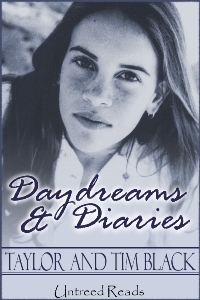 Briefly describe your journey in writing your book.
Briefly describe your journey in writing your book. While my daughter Taylor underwent treatment for brain cancer she and I kept diaries. When my daughter Courtney found Taylor's diary years after her death I embarked on writing the book as it was Taylor's intention to have her cancer diary published to inspire other kids with cancer. Looking over my own diary I realized Taylor's was far superior and that I could forget my diary and do memories of her at different ages instead. So Taylor was no longer just a cancer patient but a person. Daydreams and Diaries is the result.
What genre are your books? Do you write in more than one genre?Daydreams and Diaries is non-fiction, but I have a YA book The Kids from Cassadaga at SynergEbooks.com. So I write in both fiction and non-fiction and have used pen names in short stories.
Did you query agents and traditional publishers? Did you receive an offer of representation or a book contract? Yes, I queried several agents, but no one was interested.
What factors influenced your decision to sign with Untreed Reads?I bought the 2011 Writer's Markets and opened it and there was Untreed Reads. My thought was: I hadn't had any luck with traditional methods, so why not try an e-book. Sold it shortly thereafter. Synergebooks was the same way for the YA book. Go figure.
How involved are you during the creative process for your book's cover design?I sent Untreed a number of photos and they selected one for the cover.
Do you plan to self-publish any other books or will you stay with Untreed Reads?I haven't self-published anything yet, but I have a non-fiction book that I am thinking of sending to Smashwords.
What kinds of social media [twitter, facebook, webpage, blog, writing forums] are you involved with trying to garner attention for your book(s)? I use Facebook.
How do you feel about the world of digital publishing? Do you think it will replace traditional publishing one day? Do I? Yes? When? Hasn't it already?
What is the biggest thing you've learned during your journey as an author? Persistence.
Do you have any advice for new authors?Keep writing, don't give up. I've been publishing short stories and feature articles for 35 years but Daydreams was my first book.
What's next for you?Trying to market a sf at the moment. I ran for school board in 2008 and lost, so I decided to destroy my home town in a novel in response. It would be fun seeing that published.
I am also starting a novel set in my hometown during WWII.

Buy Daydreams and Diaries http://store.untreedreads.com/index.php?main_page=product_info&cPath=68_8_107&products_id=172
Published on October 27, 2011 05:00
October 26, 2011
World of Symbols: Cyclops
[image error]
By Michelle SnyderThe SymbologistThe White Knight Studiowww.whiteknightstudio.com
The legendary Cyclopes (plural of "Cyclops") were a race of giants who created Poseidon's trident, Artemis's bow, Zeus's lightning, and other hero weapons and tools. They were said to have brute size and strength, and are credited with massive masonry such as megalithic observatories.
Despite their notorious size the single eye of the Cyclopes is their most defining characteristic. The function of ancient megalithic sites provides a clue as to the reason for the unusual image of the giant with an eye in its forehead: the huge stone observatories were built across the continent, to measure the movement of the heavens, and support agriculture and navigation. The Cyclopes association with megalithic observatories makes it reasonable to conclude that they were skilled in astronomy. Such expertise requires development of tools; if this is the case, then we can connect Cyclopes to the use of lenses, which dates back to circa 4200 BC. Lenses were not uncommon in antiquity; an excavation in ancient Troy uncovered many optical lenses. In the British Museum there are a collection of these and other lenses, one of which resembles a hand mirror. These artifacts give rise to speculation that many "sun disc" symbols depicted with gods and goddesses could actually represent reflective lenses.
Other one-eye symbols are important to consider here. Images depicting one eye, sometimes surrounded by radiating rays as on the $1 bill, are often found accompanied by symbols of planets and stars. It is then not difficult to associate one-eye symbolism with astronomy. Why one eye? Imagine yourself looking through a telescope or spyglass. You must first close one eye to use these tools, leaving one eye open. Ancient astronomers used huge single standing-stones to measure the movement of stars; in doing so they also had to close one eye. There are other mythological beings described as having one eye. According to ancient Norse legend, Odin sacrificed an eye for enlightenment, and he was given the runes; ancient rune patterns are very similar to the constellations that were over his kingdom of Asgard. Perhaps one-eyed images of Odin symbolize his mastery of astronomy.
The Cyclopes were descendants of the Watchers and Giants of circa 14,000 BC. These ancient cultures were adept at astronomy, and were able to use the stars to navigate, and to travel the planet millennia ago. The Cyclopes inherited this knowledge from their elders through oral tradition and symbolism just as it had been shared for generations before them. Some legends surrounding these huge one-eyed creatures make them out to be raging primal beasts, as in the 1981 movie "The Clash of the Titans," but this idea conflicts with the masonry and tools credited to their craftsmanship. Megalithic stones were hewn to perfection, and aligned according to the movement of the stars and planets. Zeus's lightening and Poseidon's trident were powerful weapons, and cleverly crafted. Could the precision of these constructs have been accomplished by raging, out of control beasts? More likely, the Cyclopes' large, powerful image represents their position in society, just as the images of Egyptian Pharos and gods were larger than the regular people depicted in their hieroglyphic records. Greeks sculpted enormous statues of their gods. Even today we perceive our experts as being larger-than-life. Article and artwork © 2011 Michelle Snyder, author of Symbology: Decoding Classic Images , available at Amazon and Barnes & Noble online, and at The Book Rack Bookstore in Arlington. Post your questions on her blog at www.whiteknightstudio.com.

The legendary Cyclopes (plural of "Cyclops") were a race of giants who created Poseidon's trident, Artemis's bow, Zeus's lightning, and other hero weapons and tools. They were said to have brute size and strength, and are credited with massive masonry such as megalithic observatories.
Despite their notorious size the single eye of the Cyclopes is their most defining characteristic. The function of ancient megalithic sites provides a clue as to the reason for the unusual image of the giant with an eye in its forehead: the huge stone observatories were built across the continent, to measure the movement of the heavens, and support agriculture and navigation. The Cyclopes association with megalithic observatories makes it reasonable to conclude that they were skilled in astronomy. Such expertise requires development of tools; if this is the case, then we can connect Cyclopes to the use of lenses, which dates back to circa 4200 BC. Lenses were not uncommon in antiquity; an excavation in ancient Troy uncovered many optical lenses. In the British Museum there are a collection of these and other lenses, one of which resembles a hand mirror. These artifacts give rise to speculation that many "sun disc" symbols depicted with gods and goddesses could actually represent reflective lenses.
Other one-eye symbols are important to consider here. Images depicting one eye, sometimes surrounded by radiating rays as on the $1 bill, are often found accompanied by symbols of planets and stars. It is then not difficult to associate one-eye symbolism with astronomy. Why one eye? Imagine yourself looking through a telescope or spyglass. You must first close one eye to use these tools, leaving one eye open. Ancient astronomers used huge single standing-stones to measure the movement of stars; in doing so they also had to close one eye. There are other mythological beings described as having one eye. According to ancient Norse legend, Odin sacrificed an eye for enlightenment, and he was given the runes; ancient rune patterns are very similar to the constellations that were over his kingdom of Asgard. Perhaps one-eyed images of Odin symbolize his mastery of astronomy.
The Cyclopes were descendants of the Watchers and Giants of circa 14,000 BC. These ancient cultures were adept at astronomy, and were able to use the stars to navigate, and to travel the planet millennia ago. The Cyclopes inherited this knowledge from their elders through oral tradition and symbolism just as it had been shared for generations before them. Some legends surrounding these huge one-eyed creatures make them out to be raging primal beasts, as in the 1981 movie "The Clash of the Titans," but this idea conflicts with the masonry and tools credited to their craftsmanship. Megalithic stones were hewn to perfection, and aligned according to the movement of the stars and planets. Zeus's lightening and Poseidon's trident were powerful weapons, and cleverly crafted. Could the precision of these constructs have been accomplished by raging, out of control beasts? More likely, the Cyclopes' large, powerful image represents their position in society, just as the images of Egyptian Pharos and gods were larger than the regular people depicted in their hieroglyphic records. Greeks sculpted enormous statues of their gods. Even today we perceive our experts as being larger-than-life. Article and artwork © 2011 Michelle Snyder, author of Symbology: Decoding Classic Images , available at Amazon and Barnes & Noble online, and at The Book Rack Bookstore in Arlington. Post your questions on her blog at www.whiteknightstudio.com.
Published on October 26, 2011 05:00
October 25, 2011
Sponsor: IN LEAH'S WAKE by Terri Guiliano Long

Book Blurb:2011 BOOK BUNDLZ BOOK CLUB PICKRecipient of the Coffee Time Reviewers Recommend (CTRR) Award
The Tyler family had the perfect life - until sixteen-year-old Leah decided she didn't want to be perfect anymore.
While her parents fight to save their daughter from destroying her brilliant future, Leah's younger sister, Justine, must cope with the damage her out-of-control sibling leaves in her wake.What happens when love just isn't enough?
This mesmerizing debut novel tells the tale of a contemporary American family caught in the throes of adolescent rebellion - a heartbreaking, funny, ultimately redemptive quest for love, independence, connection and grace.
Buy link: http://www.amazon.com/Leahs-Reviewer-Recommend-Bundlz-ebook/dp/B0044XV7PG
Reviewer comments:"Terri's way of telling this story is superb, compelling, and leaves a huge impact on you." Bookworm Nattie
"The fraught interactions between the parents and their daughter Leah are so absolutely real that I was astounded by Terri Long's mastery of human relationships at their worst--and best." Jenny Wallis
"This novel is exemplary. The writing style keeps you engrossed and the characters and their lives keep you captivated." Sapphyria
Author Bio:
 Terri Giuliano Long grew up in the company of stories both of her own making and as written by others. Books offer her a zest for life's highs and comfort in its lows. She's all-too-happy to share this love with others as a novelist and as a lecturer at Boston College.
Terri Giuliano Long grew up in the company of stories both of her own making and as written by others. Books offer her a zest for life's highs and comfort in its lows. She's all-too-happy to share this love with others as a novelist and as a lecturer at Boston College.While her passion lies in the written word, Terri's primary inspiration comes from her interest in existential philosophy and her observations of people and human nature. Her stories expand upon the subtle truths and what-ifs of everyday life. No matter where her stories journey, they always tie back to the family--the ways we love yet, in loving, too often hurt one another, the grief, the sorrow, the revelation, and the joy. Terri's goal is to offer lasting hope and deep emotional connection in a compact and entertaining package.
Her life outside of books is devoted to her family. In her spare time, she enjoys walking, traveling to far-flung places, and meeting interesting people. True to her Italian-American heritage, she's an enthusiastic cook and she loves fine wine and good food. In an alternate reality, she could have been very happy as an international food writer.
Terri loves connecting with people who share her passions. She can be reached on her website (www.tglong.com), blog (www.tglong.com/blog), Facebook page (www.facebook.com/tglongwrites) or on Twitter (www.twitter.com/tglong)
Book Excerpt:
". . . little heart of mine, believe me, everyone is really responsible to all men for all men and for everything. I don't know how to explain it to you, but I feel it is so, painfully even. And how is it we went on living, getting angry and not knowing?"Fyodor DostoevskyThe Grand Inquisitor
PrologueMarchJustine strikes a pose before the full-length mirror hanging on her closet door. Chin up, hands by her sides. She draws a breath. "My dear. . ." she begins, and stops mid-sentence. Wrinkles her nose. She's got it all wrong. She's too—Too stiff. Too grownup. Too something.She rakes her fingers over her short dark hair, sweeping the bangs out of her eyes, tugs at the hem of her pink baby-doll pajamas. She's scheduled to deliver the candidates' address at her Confirmation Mass this afternoon. When she learned, six months ago, that she had been selected speaker, Justine was ecstatic. Now, the very idea of standing in front of the whole congregation, telling hundreds, maybe thousands, of people how she's learned from her own family what it means to be part of God's larger family makes her sick to her stomach.She has no choice. She made a commitment.She folds her hands primly, setting them at chest height on her imaginary podium, glances at her cheat sheet, rolls her lower face into a smile, and begins again. "My fellow Confirmation candidates," she says this time. Justine crumples the paper, tosses it onto her bed. My fellow Confirmation candidates. What a dork. She sounds about twenty, instead of thirteen.
She screws up her face. "I can't do this," she says, wagging a finger at the girl watching her from the mirror. She would feel like a hypocrite.Justine plods to the bathroom, pees, pads back to her bedroom. The forecasters are predicting snow, starting later today. A dismal gray stratus hangs over her skylight. Her room is dark, the air raw. Her sister's blue and gold Cortland High sweatshirt lies in a heap at the foot of her bed. Justine pulls the sweatshirt over her head, retrieves the balled-up paper. With the back of her hand, she flattens it out, and returns to the mirror to practice.As always, on first glance, the girl in the mirror takes Justine by surprise. She's grown two inches since Christmas, isn't chubby anymore, her belly flat, the clavicle bones visible now at the base of her throat. She pushes her bangs out of her pale, darkly fringed eyes. With her fingertips, she touches her cheeks. Her features have matured, her nose long and straight, like her mother's, her cheekbones defined. She curls and uncurls her toes. She wears a size six shoe, a size and a half smaller than Leah. Her toes are long and slim, the nails painted blue.
Justine crushes the sheet of paper, tosses it in the trash, strolls to her window, raises the honeycomb shade. Spring feels a long way away, the yard empty, the trees bare. A rush of cold air streams in, under the sash. The air smells of snow. Justine presses her hand against the cool glass, the way she and her sister used to do on the windshield of their father's car, when they were small. Stop, their father would scold. You're making a mess. She smiles, remembering how Leah loved egging him on. She pulls her hand away from the glass, watches her prints disappear.
Justine wishes, sometimes, that she could disappear, too. Poof, just like the handprint. Poof, just like her sister.
Published on October 25, 2011 05:00
October 24, 2011
Interview with M.R. Gott
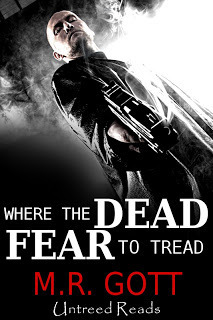 Briefly describe your journey in writing your book. I have been writing stories for years, nothing ever came to fruition, the ideas were more than my ability to properly present. Where the Dead Fear to Tread began as a short story, and then was methodically mapped out scene by scene. The short story became the first chapter and after mapping out the plot I jumped to the last chapter to ensure everything matched up and stayed on track.
Briefly describe your journey in writing your book. I have been writing stories for years, nothing ever came to fruition, the ideas were more than my ability to properly present. Where the Dead Fear to Tread began as a short story, and then was methodically mapped out scene by scene. The short story became the first chapter and after mapping out the plot I jumped to the last chapter to ensure everything matched up and stayed on track.What genre are your books? Do you write in more than one genre?My only published novel is a Supernatural thriller or Horror, though it does not fit neatly into any single genre. Everything I write is greatly influenced by the old detective and adventure pulps of the 30's into the 50's.
If you write in more than one genre, do you use a pen name?I intend to keep the name M.R. Gott on everything I get published.
Did you query agents and traditional publishers? Did you receive an offer of representation or a book contract?I sent multiple query letters to a plethora of publishers and was contacted by Untreed Reads and offered a contract. I did not attempt to contact agents.
What factors influenced your decision to sign with Untreed Reads?The Untreed Reads Contract was incredibly fair, all concerns I had before I saw the document were quickly relieved. The staff and owner have also been incredibly gracious and understanding during the copy edit and publishing process.
How involved are you during the creative process for your book's cover design?I filled out a request form for Dara England and was blown away with the results.
Do you plan to self-publish any other books or will you stay with Untreed Reads?I have no intention of self-publishing.
What kinds of social media [twitter, facebook, webpage, blog, writing forums] are you involved with trying to garner attention for your book(s)?I have a web presence on facebook, and goodreads. I also maintain a blog at http://wherethedeadfeartotread.blogspot.com/. It contains all relevant professional information regarding my writing as well as film and book reviews. I also provide links to articles analyzing many facets of the horror genre.
How do you feel about the world of digital publishing? Do you think it will replace traditional publishing one day?Traditional publishing will never be replaced. Digital publishing allows small titles a greater chance to succeed. My book is available world wide at a low cost to the publisher. Digital publishing also allows small rare titles to be purchased at a fraction of the price.
What is the biggest thing you've learned during your journey as an author?How working with seasoned professionals can develop my skills with such quick results.
Do you have any advice for new authors?Don't be obstinate with your editors and publishers. Listen to all feedback. They took the time to read it, take the time to listen.
What's next for you?The Manuscript for Where the Damned Fear Redemption the follow up to Where the Dead Fear to Tread has been completed and the editing process can now begin. I have a few short stories that should hopefully be seeing the light of day soon. If there is a market for my work I will produce to meet that need.
Where the Dead Fear to Tread is a tale of hard-boiled macabre, bridging numerous genres to reveal a story of horror, crime and revenge.
Available from the Untreed Reads Store, Amazon and most major e-book retailers for $4.99
Author BioM.R. Gott is the author of the novel Where the Dead fear to Tread and the forthcoming sequel Where the Damned Seek Closure. You can visit M.R. at his website Cutis Anserina at http://wherethedeadfeartotread.blogsp.... Aside from contacting M.R. you will find his collection of book reviews and a list of small horror films you may have missed. M.R. lives contentedly in central New Hampshire with his wife, and their three pets. Aside from writing M.R. enjoys dark coffee, dark beer and fading light.
Published on October 24, 2011 05:00
October 23, 2011
#SS NEW #Romance LOVE BY SECRETS, .99
I am very excited to announce that I have released a romance novella. I'm using pen name, Debra Elizabeth, so as not to confuse readers of my SFF books. Happy Reading!

Book Blurb:
Eighteen-year-old Emily Richardson is excited to attend this season's society balls and begin her search for a husband. She is thrilled when the dashing and handsome Connor Preston begins to show her more attention. After each ball, Emily finds a love note in her drawstring reticule, and she expects a marriage proposal from Connor any day.
When her father objects and forces Emily to accept the proposal from Lady Tisbury's shy nephew, Ethan Richardson instead, her heart is broken. How can she love her new husband when her heart belongs to the man who wrote her such beautiful love letters?
Love by Secrets is a novella of ~19,500 words (80 pages), only .99
Buy links:
Amazon http://www.amazon.com/Love-Secrets-Romance-Novella-ebook/dp/B005XMZ0NM
BN: http://www.barnesandnoble.com/w/love-by-secrets-debra-elizabeth/1106798037
Book Excerpt:
Chapter 1"Papa, where are you?" Emily Stanton asked, a little too loudly for a proper, young lady. "Hush, Emily. He will be here when he's ready, and not a moment sooner." Catherine Stanton scolded her impatient daughter."But Mama, we'll be late for the ball." Emily smoothed down her ice-blue, satin dress for the hundredth time, and adjusted the choker of pearls around her neck. The swell of her breasts peeked out of the dress's bodice, which was adorned with lace and ribbons. Matching gloves and a small, draw-string reticule rounded out her outfit for the evening.The April ball was being thrown by Lord and Lady Tisbury, and was the kick-off event of the social season in London. Everyone who was anyone would be there. Emily had counted down the days waiting for the big night to arrive. She longed to be part of the sea of shimmering silk swirling around the dance floor. She had even more reason to be excited; this had been the best week of her life. Two days ago, she had turned eighteen; the age when the hunt for a husband begins in earnest for every young lady. Lady Tisbury had promised to introduce to her a number of young men from well-regarded families. Emily shivered in anticipation. She hoped her dance card would quickly fill with the names of every eligible bachelor in the county. She had attended balls in the past; however, tonight she would not be regarded as a child, but as an eligible, young lady.Emily reached up and pushed the flower back into her light-brown hair. Nesmith, her long-time ladiesmaid, had outdone herself creating a crown of curls, adorned with little, white flowers and pearls, for this evening's festivities. Emily had watched in amazement while Nesmith worked her magic with the pins. Sitting still for more than an hour had certainly been worth the results."Mama, do I look pretty?""Emily, you look radiant tonight. I've always loved that color on you. It compliments your eyes wonderfully well.""Thank you, Mama.""Now stop fidgeting, dear. You must learn patience. It is a woman's place to wait quietly. You will have to do these things someday with your own husband, so let us practice it now."Before a pout could form on Emily's lips, her father, Mr. Riley Stanton, came into the parlor. "Oh, Papa, thank heavens you're here," she squealed with delight."Emily, dear, must you shout?"She stood on her tiptoes, and kissed her father's cheek. "Sorry, Papa, but you know I've been waiting to attend Lord Tisbury's ball all week. You must have heard us come down the stairs nearly 30 minutes ago."Mr. Stanton let a sly smile touch his lips. "I must have lost track of time. No matter; I'm here now. Are my ladies ready?""Yes indeed!" Nesmith entered the parlor, and helped Emily and Mrs. Stanton into their evening coats. "Thank you, Nesmith," Emily said. With a flounce of her skirt, she led the way to the family coach. Mr. Stanton held out his arm for his wife. "Are you ready for this, Mrs. Stanton?"Catherine nodded. "Do we really have a choice, Mr. Stanton? We cannot treat Emily like a little girl anymore. The real question is, are you ready for the hordes of young men coming to court her?"Mr. Stanton chuckled. "I guess I will have to be. Time stands still for no man."The housekeeper held the door open, and the Stantons departed into the cool, night air. Mr. Stanton sat in the rear-facing seat of the carriage. Mrs. Stanton sat next to her daughter.Emily smiled as she settled her skirts. She glanced out the window. The sky was filled with twinkling stars. It was a perfect evening. She could hardly wait for the festivities to begin.


Book Blurb:
Eighteen-year-old Emily Richardson is excited to attend this season's society balls and begin her search for a husband. She is thrilled when the dashing and handsome Connor Preston begins to show her more attention. After each ball, Emily finds a love note in her drawstring reticule, and she expects a marriage proposal from Connor any day.
When her father objects and forces Emily to accept the proposal from Lady Tisbury's shy nephew, Ethan Richardson instead, her heart is broken. How can she love her new husband when her heart belongs to the man who wrote her such beautiful love letters?
Love by Secrets is a novella of ~19,500 words (80 pages), only .99
Buy links:
Amazon http://www.amazon.com/Love-Secrets-Romance-Novella-ebook/dp/B005XMZ0NM
BN: http://www.barnesandnoble.com/w/love-by-secrets-debra-elizabeth/1106798037
Book Excerpt:
Chapter 1"Papa, where are you?" Emily Stanton asked, a little too loudly for a proper, young lady. "Hush, Emily. He will be here when he's ready, and not a moment sooner." Catherine Stanton scolded her impatient daughter."But Mama, we'll be late for the ball." Emily smoothed down her ice-blue, satin dress for the hundredth time, and adjusted the choker of pearls around her neck. The swell of her breasts peeked out of the dress's bodice, which was adorned with lace and ribbons. Matching gloves and a small, draw-string reticule rounded out her outfit for the evening.The April ball was being thrown by Lord and Lady Tisbury, and was the kick-off event of the social season in London. Everyone who was anyone would be there. Emily had counted down the days waiting for the big night to arrive. She longed to be part of the sea of shimmering silk swirling around the dance floor. She had even more reason to be excited; this had been the best week of her life. Two days ago, she had turned eighteen; the age when the hunt for a husband begins in earnest for every young lady. Lady Tisbury had promised to introduce to her a number of young men from well-regarded families. Emily shivered in anticipation. She hoped her dance card would quickly fill with the names of every eligible bachelor in the county. She had attended balls in the past; however, tonight she would not be regarded as a child, but as an eligible, young lady.Emily reached up and pushed the flower back into her light-brown hair. Nesmith, her long-time ladiesmaid, had outdone herself creating a crown of curls, adorned with little, white flowers and pearls, for this evening's festivities. Emily had watched in amazement while Nesmith worked her magic with the pins. Sitting still for more than an hour had certainly been worth the results."Mama, do I look pretty?""Emily, you look radiant tonight. I've always loved that color on you. It compliments your eyes wonderfully well.""Thank you, Mama.""Now stop fidgeting, dear. You must learn patience. It is a woman's place to wait quietly. You will have to do these things someday with your own husband, so let us practice it now."Before a pout could form on Emily's lips, her father, Mr. Riley Stanton, came into the parlor. "Oh, Papa, thank heavens you're here," she squealed with delight."Emily, dear, must you shout?"She stood on her tiptoes, and kissed her father's cheek. "Sorry, Papa, but you know I've been waiting to attend Lord Tisbury's ball all week. You must have heard us come down the stairs nearly 30 minutes ago."Mr. Stanton let a sly smile touch his lips. "I must have lost track of time. No matter; I'm here now. Are my ladies ready?""Yes indeed!" Nesmith entered the parlor, and helped Emily and Mrs. Stanton into their evening coats. "Thank you, Nesmith," Emily said. With a flounce of her skirt, she led the way to the family coach. Mr. Stanton held out his arm for his wife. "Are you ready for this, Mrs. Stanton?"Catherine nodded. "Do we really have a choice, Mr. Stanton? We cannot treat Emily like a little girl anymore. The real question is, are you ready for the hordes of young men coming to court her?"Mr. Stanton chuckled. "I guess I will have to be. Time stands still for no man."The housekeeper held the door open, and the Stantons departed into the cool, night air. Mr. Stanton sat in the rear-facing seat of the carriage. Mrs. Stanton sat next to her daughter.Emily smiled as she settled her skirts. She glanced out the window. The sky was filled with twinkling stars. It was a perfect evening. She could hardly wait for the festivities to begin.
Published on October 23, 2011 06:00
October 22, 2011
Review: DREAMING OF YOU by Barbara Mack
 3.5 of 5 stars
3.5 of 5 stars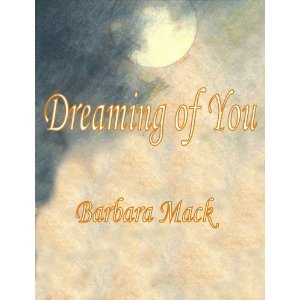 Kathleen Donaldson is an oddity in her strict 1800s society. She's unmarried at 26. She's bossy and sharp-tongued. Not the usual persona for a young lady looking for a husband. But Kathleen isn't looking for a husband. She lost the love of her life in a tragic accident and she's resigned herself to living alone. When the handsome Dr. Duncan Murdoch begins to show her more than a passing interest, she is initially repulsed by him, but is she really?
Kathleen Donaldson is an oddity in her strict 1800s society. She's unmarried at 26. She's bossy and sharp-tongued. Not the usual persona for a young lady looking for a husband. But Kathleen isn't looking for a husband. She lost the love of her life in a tragic accident and she's resigned herself to living alone. When the handsome Dr. Duncan Murdoch begins to show her more than a passing interest, she is initially repulsed by him, but is she really?This is a delightful and passionate short story (~45 pages) about two strong-willed people as they fight against their attraction to one another. The author does a very good job of portraying each of their emotions although I did find a bit of head-hopping in the some of the scenes. Had to reread some paragraphs to figure out whose head we were in. I loved the secondary characters as well.
My slight criticisms are that I think the story could have been fleshed out a bit more. I didn't get much of a picture of the society or setting. This would have added to the enjoyment of the story. Also, I do not think the cover does justice to the story. It doesn't portray romance to me at all. Despite this, if you are looking for a quick romance read, I would recommend giving this one a chance.
Published on October 22, 2011 05:00



